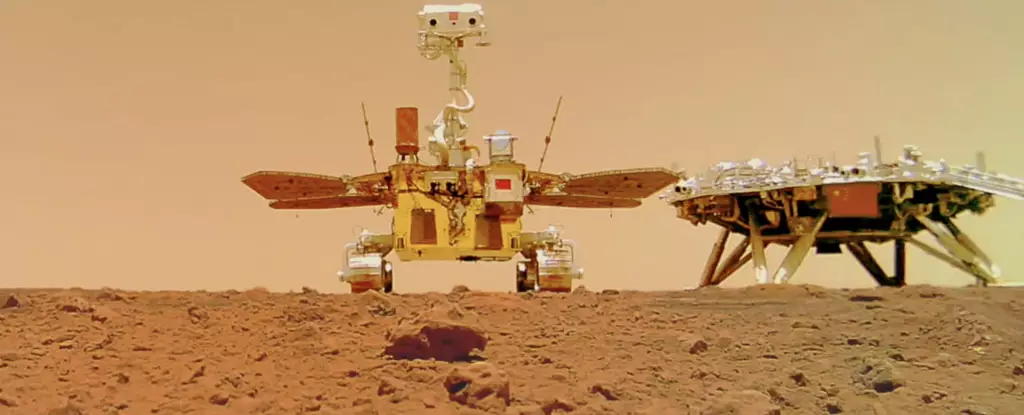The idea that Mars once possessed a vast ocean has intrigued scientists for years, igniting debates and spurring numerous studies. Recent research stemming from China’s Zhurong rover mission seems to offer new evidence supporting this hypothesis, yet the discussion continues to be colored by skepticism from the scientific community. This article delves into the recent findings, the surrounding debate, and the implications regarding the possibility of past life on the Red Planet.
Launched as part of China’s efforts to explore celestial bodies, the Zhurong rover landed on Mars in 2021, specifically in a region known as Utopia Planitia, which has been the subject of earlier studies indicating the presence of water. Following its landing, Zhurong began its systematic investigation of the Martian landscape, and the results of this exploratory endeavor were recently published in the journal Scientific Reports. The findings point to various geological features that suggest an ancient ocean once existed in the area where the rover is operating. Notably, researchers identified formations such as “pitted cones,” “polygonal troughs,” and “etched flows” that align with characteristics expected in environments once submerged in water.
This research, led by Bo Wu of The Hong Kong Polytechnic University, claims that geological formations observed in the vicinity of Zhurong are reminiscent of features typically found along coastlines on Earth. The hypothesis posits that approximately 3.7 billion years ago, Mars experienced dramatic flooding, leading to the formation of ocean-like conditions. Subsequent freezing and geological activity may have reshaped the planet’s face, leaving behind clues that speak to its watery past. However, the results are preliminary and do not definitively confirm the existence of an ocean, as acknowledged by Wu.
Despite the enthusiasm surrounding these findings, not all scientists are on board with the implications drawn from the Zhurong rover’s data. Notably, Benjamin Cardenas, an expert analyzing Martian geology, expressed skepticism regarding the significance of the evidence provided. He argues that the erosive forces of Martian winds may have significantly obscured or obliterated the signs that researchers claim to interpret as indicative of an ocean. Cardenas emphasizes that one should not underestimate the dynamism of Mars, highlighting past modeling research demonstrating that even gradual erosion would likely erase observable coastal features over billions of years.
This skepticism serves to remind us that scientific inquiry is rarely straightforward. The dynamics of Mars, influenced by its thin atmosphere and unique geological history, may be unlike any other explored planet, including Earth’s. While some researchers advocate for the possibility of an ancient ocean, findings like those from Zhurong also require careful examination of the elements at play in shaping the Martian landscape.
The ongoing exploration of Mars is not just a quest for understanding planetary processes; it is also part of a larger question regarding the potential for life beyond Earth. Many scientists theorize that life as we know it may have its roots in marine environments—deep-sea hydrothermal vents or shallow tidal pools—where essential chemicals and conditions converge. Should there be substantial evidence of ancient aquatic environments on Mars, it could provide crucial insights into similar processes occurring elsewhere in our Solar System or beyond, and whether or not life has ever existed outside of Earth.
Even within a framework of skepticism, the potential discovery of past oceanic conditions on Mars presents intriguing possibilities. Is Mars simply a barren wasteland, or could it have hosted life forms during its wetter epochs? Uncertainty remains, but the curiosity driving Mars exploration continues to uncover geological mysteries that call for further investigations and potential missions aimed at returning Martian samples to Earth.
The revelations from the Zhurong rover add another layer to the complex narrative of Mars’ history, capturing both intrigue and skepticism. As scientists peel back the layers of this captivating planetary enigma, the quest continues for definitive evidence that could answer foundational questions about our place in the cosmos. Whether Mars was a cradle for life or simply a unique geological anomaly remains to be seen, but exploration efforts are poised to unearth critical truths that could redefine our understanding of life in the universe. The conversation about ancient oceans on Mars is just beginning, and it promises to evolve as new data surfaces.


Leave a Reply